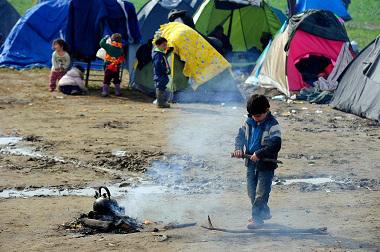
As the European Union prepares for critical talks on the rules governing applications from people seeking protection in Europe, UNICEF has called for the interests and rights of children to be given greater priority.
In the coming days, 28 EU member states and the European Parliament will begin examining a draft proposal drawn up by the European Commission to reform the so-called Dublin Regulation.
The new rules will determine which State is responsible for considering an application for international protection that has been submitted anywhere in the EU.
The debate comes amid a refugee and migration crisis that has overwhelmed Europe’s existing asylum process, and left in the balance the fate of more than 400,000 children who applied for asylum in Europe between January and November 2015.
“These discussions are an opportunity to strengthen vital safeguards to which children seeking asylum in Europe are entitled under international law,” said Noala Skinner, Director of the UNICEF Brussels Office. “For Europe’s common asylum system to be humane, fair and efficient, the protection of children must be a central priority.’
Among the steps UNICEF is calling for:
Timely decisions to avoid exposing children to risk: Under the current Dublin Regulation, it can take 11 months between a child’s arrival and his or her transfer to the State that will consider his/her application. Such a lengthy process could hinder family reunification and expose the child to various risks. UNICEF recommends a three-month deadline.
Swift information sharing: States should ensure that every child – whether or not accompanied by a family member – is promptly (within 72 hours) provided with information on the right to claim international protection and how to access it.
Harmonised application of the “best interests” principle for every unaccompanied and separated child. This would mean that all States apply the same criteria (such as the child’s safety and wellbeing) when considering their future. The child’s views and opinions should also be heard throughout the process.
More resources and professionals should be made available to ensure that guardians are appointed immediately to adequately protect, guide and support an unaccompanied or separated child.
Community alternatives to detention: no child should be detained pending his or her transfer to another state, the appointment of a guardian or provision of child-appropriate accommodation. UNICEF calls for use of non-custodial, community-based alternatives for children and their families claiming international protection.
Source: UNICEF
 FR
FR EN
EN AR
AR








